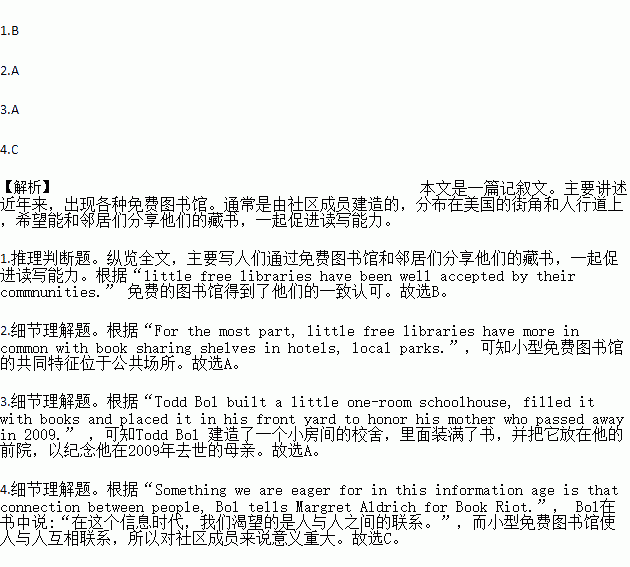题目内容
In recent years, little free libraries of all shapes and sizes have popped up. Often built by community members, they could be found on street corners and the sidewalks across the United States, hoping to share their book collections with their neighbors. Minneapolis, Minnesota, even hosted the first Little Free Library Festival, where book fans came together to promote literacy (读写能力)in their communities.
For the most part, little free libraries have more in common with book sharing shelves in hotels, local parks, coffee shops and other public spaces than the traditional public library. Based on the rule of "take a book, leave a book," these little libraries can take many forms from birdhouse-like wooden structures to redesigned newspaper selling machines, Robert Wirsing writes for the Bronx Times.
The little free library organization began when a citizen of Hudson, Wisconsin, named Todd Bol built a little one-room schoolhouse, filled it with books and placed it in his front yard to honor his mother who passed away in 2009. Together with a local educator named Rick Brooks, the two began placing little free libraries across Wisconsin and sharing the idea with people across the country.
"Something we are eager for in this information age is that connection between people," Bol tells Margret Aldrich for Book Riot. "I want to show how Little Free Library is about readers inspiring readers. It goes on and on."
While Little Free Libraries seem like a harmless means to promote literacy by sharing books with neighbors, a few of the roadside landing libraries have caused minor legal problems. officials in Los Angeles and Shreveport, Louisiana, have told some citizens that their homemade libraries broke city roles and that they would have to remove them to avoid being fined.
Still, little free libraries have been well accepted by their commnunities. For anyone interested in making their own at home, the organization has posted helpful tips and guides for building the little book lending boxes in their neighborhoods.
1.What can we know about the little free libraries in America?
A. They are state-owned.
B. They are popular nationally.
C. They are set up to sell books.
D. They help those with no books to read.
2.What is a common character of little free libraries?
A. They lie in many public places.
B. They share a large collection of books.
C. They compete with traditional public libraries.
D. They exist mainly in the form of wooden houses.
3.What is Todd Bol's primary aim of building, a library?
A. To remember his dead mother.
B. To help people form a habit of reading.
C. To set an example to other communities.
D. To share his knowledge, with other citizens.
4.What does Todd Bol think of the little free libraries?
A. They cause minor legal problems.
B. They should continue to exist.
C. They mean a lot to community members.
D. They should be supported by the government.
 期末冲刺100分创新金卷完全试卷系列答案
期末冲刺100分创新金卷完全试卷系列答案调查表明,有许多青少年有不吃早餐的习惯。请根据表格内容用英语写一篇短文。
原因 | 晚上学习太晚,早上起得迟;用吃早餐的钱去上网玩游戏;一些女孩为保持苗条身材常不吃早餐。 |
结果 | 不利于身体健康;上课时想睡觉;影响记忆力和学习成绩。 |
建议 | 早餐不可少,它能提供全天所需能量的30%。青少年健康应从早餐开始。 |
注意:1.不要逐条翻译,可适当增加情节,使内容连贯。
2.词数100左右;
3.参考词汇:苗条的:slim能量:energy。
A survey shows that many students do not have breakfast.________________________________________
____________________________________________________________________________________________
____________________________________________________________________________________________
____________________________________________________________________________________________
____________________________________________________________________________________________
____________________________________________________________________________________________
____________________________________________________________________________________________
____________________________________________________________________________________________
______________________________________________________

